2006 Lower Section National Finals - First Section retrospective
27-Sep-2006The Perfect Fool provided a stern test of nerves and skill, but also patience as the First Section set work had more wrong notes than could be found in a Premiership managers back pocket. The winners didn't seem to mind though.
Whilst the plaudits go to Kibworth who won the First Section with as convincing performance of Peter Parkes' adaptation of ballet music from ‘The Perfect Fool' as you'd wish to hear, the abiding memory of the contest will be the talking points, before, during and afterwards about the production of the score and the problems it created for the bands, the conductors and the adjudicators.
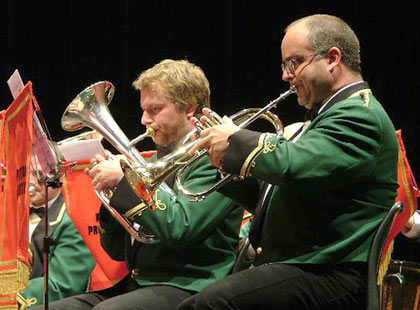
Horns of plenty: Kibworth's Guido Damore and Nathan Waterman lead the midlanders to victory
It is a pity that the retrospective has to comment on the state of the score that was an embarrassment and one that let the arranger down very badly indeed, but in its way it rather undermined what was a fine contest. The state of the score didn't go un-noticed by the adjudicators Malcolm Brownbill and David Horsfield either, as reference was made to it on stage prior to the results when Malcolm admitted; "We were well aware of the errors and even though a number of bands still played wrong notes through no fault of their own on the stage we did not penalise them for it." See what we mean by undermining?
Everybody is human and makes mistakes; players and conductors don't mind making the odd change, but for the music to be published in the way it was with technology as it is, isn't acceptable for any contest. That it was published for one of British banding's elite events just isn't funny at all and if it was proof-read by the publishers or members of the music panel, surely the errors were spotted?
Can you really imagine one the cricketing world's most articulate and respected men, Richie Benaud having a book published with his name attached to it in the way ‘The Perfect Fool' was produced? It just wouldn't happen would it and when you consider that one of the judges here was a music publisher, it makes you wonder what he really thought - "I spent a whole day working on the piece just to get it to an acceptable level. I have a great amount of sympathy for the bands, the players and the conductors – it wasn't what they deserved," was David's official comment. Goodness knows what he thought in private as a publisher, let alone an adjudicator faced with judging the piece?
The publication of the study score of ‘The Night to Sing' at the British Open in 2005 caused uproar, and twelve months on, the lesson doesn't seem to have be learnt. Mistakes happen, but no stone should be left unturned to make sure that everything is as it should be when selecting the music through to its publication.
Enough said, lessons have to be learnt from this; let's get back to the contest itself…
The overall standard of the contest was a mixed bag; the two top bands were absolute crackers and there were some good shows that battled for the other podium prizes, but after them the standard did vary considerably. A couple of bands can consider themselves a tad unlucky not too have featured in the mix, but one of the things that stood out was the amount of bad tuning within a number of performances and a surprise at this level; something that was eluded too by Malcolm Brownbill afterwards when talking to 4BR. "It was a very fine performance and so well led by what we could tell was a conductor who had a great understanding both of the score and the music."
The music certainly proved to be a tough test with the pianissimo playing particularly in the ‘Dance of the Spirit of the Water' section really stretching the bands. David Horsfield also acknowledged the contributions of the flugel playing to 4BR afterwards but whilst giving to the audience his thoughts, he cited Black Dyke's performance at The Open referring to that as the level the bands needed to aspire too to succeed through practicing such things as pianissimo – quiet playing in the decisive middle movement wasn't always what the judges were looking for
The bands that did well caught the atmosphere of the music setting out to perform ballet music in an orchestral manner. Some of the bands though were very tentative in their approach; this could be put down to the dry acoustic of the hall and the stage that leaves you feeling like you're on your own, not to mention the score, which surely affected confidence. Playing in this hall is an invaluable experience for any band though and those that have played here previously (in all the sections) knew what to expect and were all the better for it.
No such problems for Kibworth and John Berryman though. The early part of the contest that included a couple of bands fancied to do well, didn't come to life as expected so when the Midlanders came on stage, they had a golden opportunity to take the contest by the scruff of its neck and they did it so well, that it would have taken something special to move them from the top prize.
The opening was so tight and authoritative from the trombones and ensemble and confidence just soared through the band. The dynamics were excellent and it was certainly exciting. The delicacy of the ‘Water' section was captured beautifully, none more so than through the flugel playing of Guido Damore, aided by Bob Stradling on soprano. The final ‘Dance of the Spirits of the Fire' was a real cracker with the playing being kept under control whilst maintaining its excitement. The overall performance was aided by some fine percussion work that gave the section the Best Instrumentalist prize – a brave choice by the judges but one that was very well deserved.
Wire Brass directed by Paul Andrews made its first ever contesting appearance in 2002 and they said goodbye to the First Section just as quickly as they have said it to all the others they have competed in with a fabulous performance that was certainly worthy of the runners-up spot. It really was very good indeed and if it had have come out on top, you could understand why it had swayed the judges.
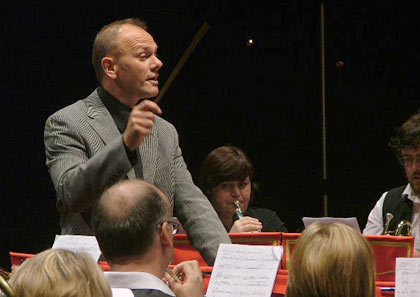
Photo: Steve Jack
Wire in the blood: Paul Andrews leads Wire Brass into a well deserved runners up spot
Playing from a late number sixteen draw, the band set themselves up in a compact manner, with a number of chairs facing inwards and the cornets on either side instead of just on the left. This immediately projected a completely different sound towards the box that was so musically well crafted by Paul Andrews.
It was a bold approach but it worked so well with some of the tightest, most precise playing of the whole contest; great dynamics, atmospheric contrasts and a final section reminiscent of a blazing inferno – quality stuff and a cracking achievement for the band to have got into the Championship Section – something you suspect the band will relish and won't be overawed by at all.
Fellow North West contenders, United Co-op Crewe directed by Jef Sparkes also produced an interpretation that had much to admire about it and pre-Wire it was comfortably in second place. The opening was cautious but deliberate and gave the music the opportunity to breathe and evolve, paying dividends for the band. 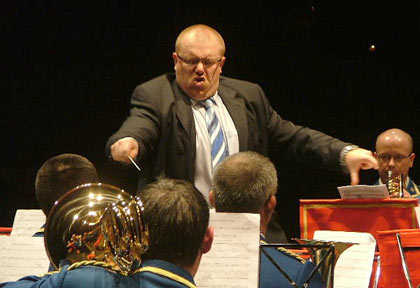
Photo: Steve Jack
Sparkes of delight: Jef Sparkes lays it all on the line to take third place
Yes, they had a couple of wobbles in the ‘Water' section but nothing to set the alarm bells going with some effective flugel playing from Sarah Brown and a closing ‘Fire' Section that was one of the best of the day – real quality, no-nonsense playing. Everyone within the band seemed delighted with their performance and placing and another year in the First Section will benefit them long term.
Dalmellington followed Crewe on stage and they delivered a performance that had plenty of fine moments with a real warmth of sound which just had a harsh edge when they tried to really meet the demands of the louder dynamics whilst the tempo's were very positive, even a touch on the quick side in the final section. 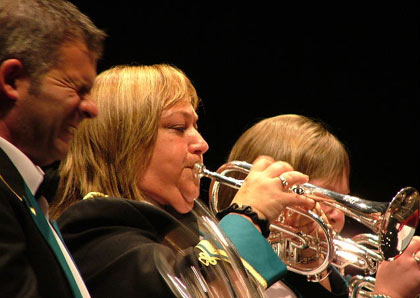
Ouch!! Dalmellington's soprano player David Roxburgh winces, but they still got fourth spot.
Archie Hutchinson had done a cracking job and as your 4BR correspondent was putting his final touches to his top six, he originally went for them in fourth spot, then changed his mind and opted for United Co-op Crewe instead and dropping the Scots into fifth place. We should have stayed with our original choice!
It was down Steve Sykes and Lydbrook to bring the contest to a close and with nothing to lose, they went for it big style, with no holding back at all. It was very purposeful and forthright throughout with the middle section having containing lots of well judged lyrical playing. You can't blame the band for going for it from the off, but as a result it didn't quite have the impact that was required in the final section. It was good playing though and even if it wasn't in the same bracket as Kibworth or Wire, 5th place was more than justified.
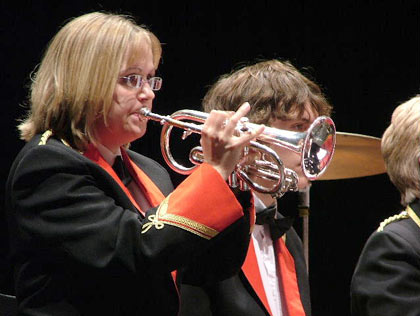
Super sop: Lydbrook's Tracey King does her bit
Gary Wyatt's Foss Dyke appealed more to the men in the box than 4BR. Playing straight after the comfort break gave them the chance to give the performance some real impetus - which it did for the judges, but for us, it appeared to take time to settle and lacked the consistency to really make a big impact. It was a performance of merit though and an indication that this is a band both growing in confidence and strength.
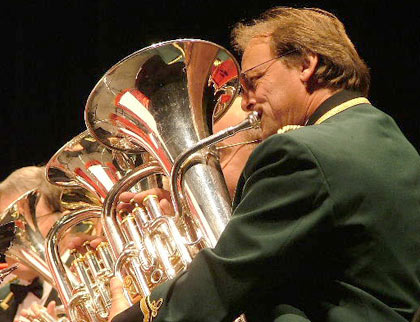
Foss Dyke charge: Barry Tupper leads his euph section to help gain 6th place
West Country outfit, Helston made it to the finals for the first time and gave the judges their first serious marker from a number four draw. It was one of those performances that grew in stature as it went along with the final two sections benefiting from some fine solo playing from the soprano, the experienced Jeremy Squibb and flugel, Catriona Bell, not too mention good ensemble work. They were thrilled with 7th place though which is a fine achievement for a band, not just making their debut here, but who have had a full calendar of engagements, week in, week out throughout the summer with very little time to enjoy the beautiful surroundings of their town.
Penclawdd and Tony Small did Wales proud with an interpretation that really came into its own in the latter stages. As with Helston, if it had just had that little bit more control earlier in the piece it could have sneaked in via the back door into the prizes. The final section was a real fire-cracker of a show capturing the mood well and it was nice to see smiles on the faces of the band and the appearance of Gareth Small, one of the countries top trumpet players with the Halle Orchestra lending a helping had to the cause too.
Pre-contest favourites Marsden Silver (Riverside Brewery) didn't find favour with the adjudicators and had to settle for 9th place. It had plenty of quality moments but uncharacteristic errors took that polish off an interpretation that was well constructed by Glyn Williams. The band will no doubt be kicking themselves for not making the impact they would have wanted to and will see it as a real opportunity lost to go into the Championship Section in Yorkshire with the big boys as a National Champion Band. On their day they can play with a greater consistency and if everybody had played to the form shown by soprano Andrew Lofthouse it could have been a very different story.
Thomas Wyss's Northop was yet another band fancied to do well and it wasn't a bad one for us by any means. However, like Marsden it wasn't the finished article that was required on the day, even though the interpretation was excellent and at times it did sound exceptionally well delivered. The overall band sound was fine and they did appear to capture an idyllic mood in the ‘Water' Section, but those annoying errors and a slightly over excitable final section just took the gloss off.
From tenth place downwards, none of the performances really got grips with the music completely and it was a case of a lack of consistency, erratic stylistic approaches and those tuning problems, in addition to nerves that cost them on the day.
Kevin Belcher's Drighlington didn't get anywhere near the level of performance that took them to victory in March and its not unjust to suggest that the cautious approach was perhaps a touch too steady at times especially early on and only appeared to be completely at ease in the latter stages.
Someone has to play number one and it was KM Medway who never really settled on the day and suffered from nerves and touches of poor intonation that cost them valuable points. An early draw can sometimes have a negative effect on the contest psyche and the body language here suggested that they felt that they knew it wasn't going to be their day from the word go.
Haverhill may have come thirteenth but they'll benefit from the experience of playing here. They've had their fair share of good results recently (Butlins, not too mention the Regionals) but they just didn't have the quality that was required to come any higher than they did, although they did have their moments when things clicked very neatly into place. Like other bands here though, they'll be championing at the bit to come back in 2007.
Graham O'Connor's Riddings opened with the trombones standing, projecting a nice sound. It certainly had potential to be a cracker at this point, but the quiet slow playing that was required had too much hesitancy about it and although the band responded to the MD's energy, there were too many clips that stopped them finishing higher on the day.
RMT Easington and Broxburn were inseparable on the day having played next to each other in the draw and coming next to each other in the results table.
You've got to hand it to David Hirst because he crafted a well conceived interpretation for RMT Easington. It was steady stuff that contained some fine moments from the cornets in particular, but it did suffer from errors and nerves at times which was a real pity.
Broxburn weren't at the races for us. It was very uncertain and tentative on more than one occasion and although George Doherty led by example on top man, it just wasn't to be. When the good stuff appeared it was closely followed by a sense of unease with the music with a high error count – a real pity.
Graeme Tindall's Felling didn't make the necessary impact that was required and whilst it had many pleasing moments, the inconsistent playing cost them enormously on the day that like Broxburn was a shame. They certainly would have liked to have made a better impression than they did, but there were plenty of encouraging signs on show for the immediate future.
You've got to give it to Kibworth and John Berryman though. If you play for John Berryman, you play for a very knowledgeable musician who knows how to bring the best out of any band he conducts. He clearly enjoys the work with Kibworth and was commented to 4BR afterwards: "I felt for along time that the band haven't had their just rewards in the past couples of years' before going onto comment ‘It is one of the most satisfying victories to of my career."
The hard work that John has put in has paid dividends and they are a band that should flourish in the rarified air of the Championship Section. Indeed, it would be foolish to rule them out of making an impression in the top division in the next year or so. Kibworth were worthy champions on the weekend and the reasons were plain to hear.
Malcolm Wood.















